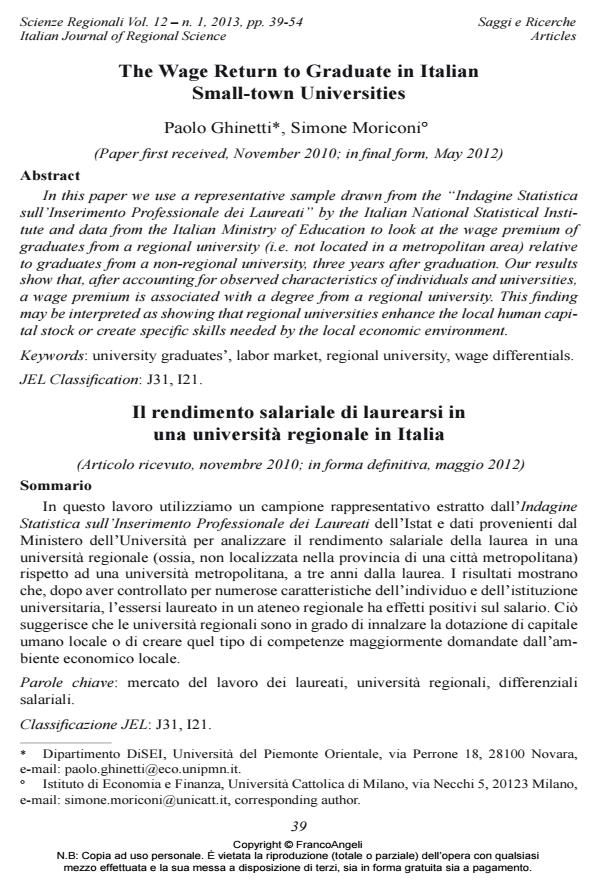The Wage Return to Graduate in Italian Small-town Universities
Titolo Rivista SCIENZE REGIONALI
Autori/Curatori Paolo Ghinetti, Simone Moriconi
Anno di pubblicazione 2013 Fascicolo 2013/1 Lingua Inglese
Numero pagine 15 P. 39-53 Dimensione file 201 KB
DOI 10.3280/SCRE2013-001003
Il DOI è il codice a barre della proprietà intellettuale: per saperne di più
clicca qui
Qui sotto puoi vedere in anteprima la prima pagina di questo articolo.
Se questo articolo ti interessa, lo puoi acquistare (e scaricare in formato pdf) seguendo le facili indicazioni per acquistare il download credit. Acquista Download Credits per scaricare questo Articolo in formato PDF

FrancoAngeli è membro della Publishers International Linking Association, Inc (PILA)associazione indipendente e non profit per facilitare (attraverso i servizi tecnologici implementati da CrossRef.org) l’accesso degli studiosi ai contenuti digitali nelle pubblicazioni professionali e scientifiche
In this paper we use a representative sample drawn from the "Indagine Statistica sull’Inserimento Professionale dei Laureati" by the Italian National Statistical Institute and data from the Italian Ministry of Education to look at the wage premium of graduates from a regional university (i.e. not located in a metropolitan area) relative to graduates from a non-regional university, three years after graduation. Our results show that, after accounting for observed characteristics of individuals and universities, a wage premium is associated with a degree from a regional university. This finding may be interpreted as showing that regional universities enhance the local human capital stock or create specific skills needed by the local economic environment.
In questo lavoro utilizziamo un campione rappresentativo estratto dall’Indagine Statistica sull’Inserimento Professionale dei Laureati dell’Istat e dati provenienti dal Ministero dell’Università per analizzare il rendimento salariale della laurea in una università regionale (ossia, non localizzata nella provincia di una città metropolitana) rispetto ad una università metropolitana, a tre anni dalla laurea. I risultati mostrano che, dopo aver controllato per numerose caratteristiche dell’individuo e dell’istituzione universitaria, l’essersi laureato in un ateneo regionale ha effetti positivi sul salario. Ciò suggerisce che le università regionali sono in grado di innalzare la dotazione di capitale umano locale o di creare quel tipo di competenze maggiormente domandate dall’ambiente economico locale.
Keywords:Mercato del lavoro dei laureati, università regionali, differenziali salariali
Jel codes:J31, I21.
- Agasisti T., Catalano G. (2006), Governance Models of University Systems-towards Quasi-markets? Tendencies and Perspectives: A European Comparison. Journal of Higher Education Policy and Management, 28, 3: 245-262. DOI: 10.1080/13600800600980056
- Anderson R., Quigley J., Wilhelmsson M. (2004), University Decentralization as Regional Policy: The Swedish Experiment. Journal of Economic Geography, 4, 4: 371-388. DOI: 10.1093/jnlecg/lbh031
- Andres L., Looker E. D. (2001), Rurality and Capital: Education Expectations and Attainment of Rural, Urban/rural and Metropolitan Youth. The Canadian Journal of Higher Education, 31, 2: 1-45.
- Bagues M., Sylos-Labini M. (2007), Do On-line Labor Market Intermediaries Matter? The Impact of Almalaurea on the University-To-Work Transition. New York: NBER, Working paper n. 13621.
- Black D., Smith J. (2004), How Robust is the Evidence on the Effects of College Quality? Evidence from Matching. Journal of Econometrics, 121, 1-2: 99-124.
- Bratti M., Checchi D., De Blasio G. (2008), Does the Expansion of Higher Education Increase the Equality of Educational Opportunities? Evidence from Italy. Labor, 22, s1: 53-88.
- Brunello G., Cappellari L. (2008), The Labor Market Effects of Alma Mater: Evidence from Italy. Economics of Education Review, 27, 5: 564-574. DOI: 10.1016/j.econedurev.2007.05.004
- Brunello G., Gambarotto F. (2007), Do Spatial Agglomeration and Local Labor Market Competition Affect Employer-provided Training? Evidence from the UK. Regional Science and Urban Economics, 37, 1: 1-21. DOI: 10.1016/j.regsciurbeco.2006.06.006
- Corak M., Lipps G., Zhao J. (2003), Family Income and Participation in Post-secondary Education. Ottawa: Statistics Canada. Analytical Studies Branch Research Paper Series, Catalogue n. 11F=19MIE2003210.
- Eskeland G., Filmer D. (2007), Autonomy, Participation and Learning: Findings from Argentine Schools, and Implications for Decentralization. Education Economics, 15, 1: 103-127. DOI: 10.1080/09645290601133951
- Fan C. S., Stark O. (2008), Rural-to-urban Migration, Human Capital, and Agglomeration. Journal of Economic Behavior & Organization, 68, 1, October: 234-247.
- Frenette M. (2005), Is Post-secondary Access More Equitable in Canada or the United States?. Ottawa: Statistics Canada. Analytical Studies Research Paper Series, Catalogue n. 11F0019MIE2005244.
- Frenette M. (2009), Do Universities Benefit Local Youth? Evidence from the Creation of New Universities. Economics of Education Review, 28, 3: 318-328. DOI: 10.1016/j.econedurev.2008.04.004
- Gunasekara C. (2006), Universities and Associative Regional Governance: Australian Evidence in Non-core Metropolitan Regions. Regional Studies, 40, 7: 727-741. DOI: 10.1080/00343400600959355
- Moretti E. (2004), Estimating the Social Returns to Higher Education: Evidence from Longitudinal and Repeated Cross-sectional Data. Journal of Econometrics, 121, 1-2: 175-212.
- Persson H., Regnér H. (2004), Universities in the Regional Economy. Evidence From Swedish Employer-Employee Linked Data. Stockholm University: Swedish Institute for Social Research (SOFI), Working Paper, n. 7/2004.
- Schiller D. (2006), Nascent Innovation Systems in Developing Countries: University Responses to Regional Needs in Thailand. Industry and Innovation, 13, 4: 481-504. DOI: 10.1080/13662710601032903
- Storper M., Scott A. J. (2009), Rethinking Human Capital, Creativity and Urban Growth. Journal of Economic Geography, 9, 2: 147-167. DOI: 10.1093/jeg/lbn052
- Theodora Y. (2007), Approach to the Effects of Greek Regional Universities on Development of the Country Regions. In: Coccossis H., Psycharis Y., Regional Analysis and Policy. The Greek Experience. Heilderberg: Physica Verlag. 249-270.
Paolo Ghinetti, Simone Moriconi, The Wage Return to Graduate in Italian Small-town Universities in "SCIENZE REGIONALI " 1/2013, pp 39-53, DOI: 10.3280/SCRE2013-001003